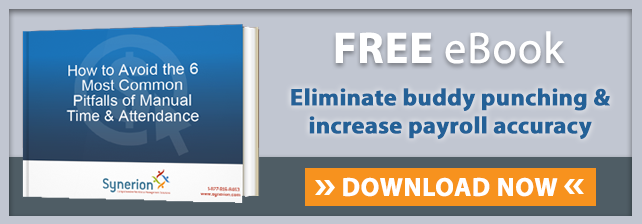 Every once and a while, overtime can be a good thing for employees. Whether it's to save up for vacation or get ahead on a payment, a few extra hours can be a godsend. But when employees are continuously being tapped for extra hours, that excitement can turn to disappointment. With less time to spend with family or participate in activities, employees can become neglectful, annoyed, and even angry. If you're afraid you're asking too much of your employees, check for these five warning signs that your employees are overworked.
Every once and a while, overtime can be a good thing for employees. Whether it's to save up for vacation or get ahead on a payment, a few extra hours can be a godsend. But when employees are continuously being tapped for extra hours, that excitement can turn to disappointment. With less time to spend with family or participate in activities, employees can become neglectful, annoyed, and even angry. If you're afraid you're asking too much of your employees, check for these five warning signs that your employees are overworked.
Tempers are Running High
No matter how harmonious the workplace, there will always be some degree of conflict but overall, that conflict should be limited and sporadic. When employees are overworked and being pushed to their mental breaking point, that conflict can reach an all-time high. Managers spend more time reducing co-worker friction than performing normal job duties and employees spend more time hearing and participating in the conflict than doing their job. When your HR department is fielding more co-worker complaints and conflicts than normal, consider whether employees are being overworked.
Tardiness is Rampant
Nearly everyone has worked a job where they rounded the parking lot once or twice before actually going inside. Often, that reluctance to get to work has nothing to do with co-workers or managers but simply spending too many hours in the same building. Tardiness that spreads beyond a department or a single employee points to a much larger problem regarding overwork and exhaustion. A quick look at your time and attendance software can indicate whether employees are being overworked to exhaustion.
Blame is the Primary Focus
Mistakes happen but how an organization reacts to them speaks volumes about the health of the company. For productive and growing companies, mistakes are viewed as learning opportunities. Managers and employees work together to pinpoint the crux of the error and create a system to prevent it from happening again. When employees are overworked and stressed, blame is the driving force. Employees point to people rather than processes for the error because it's easier to fire a person than fix a process. Pay attention during your next meeting to find out whether too many hours are ruining process improvements in your company.
Turnover is Peaking
Turnover is inevitable but when rates of turnover start to spike, you may be overworking your employees into another job. Few employees will raise their voice over long hours but many will talk with their feet, quitting to find another job that allows more family time. A monthly look at your turnover rate can yield some interesting information and if you notice it continually increasing, it may be time to look into your exit interviews to determine whether long hours are to blame.
Customers are Complaining
Even the best companies field complaints but overworking your employees can cause that number to go sky high. When employees are overworked, they can not only lash out at co-workers but also customers. In addition, employees may simply neglect customers due to having too many other time commitments. Customer feedback should be a primary focus when collecting business data and an increase in complaints about staff behavior can point to a serious problem with hours. Go over your customer feedback to determine whether overwork is effecting your business.
Overtime may be part of the job but when that overtime restricts employees from having a life outside the office, it's time to reassess. If you notice any of these issues in your own company, it may be time to start automating processes and reducing overtime in your company.
